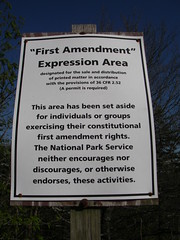Disclaimer: I am not a lawyer. I am a law student. In accordance with ABA policy, this blog should not be viewed as legal advice. It is simply my experiences, opinions, and stuff I looked up on the internet.
While most of what we post online is protected by the First Amendment, not all speech is protected. Therefore, it is logical to think that anything that would be illegal to publish in a newspaper is likely illegal if it was posted online. There are a fair number of things that could probably get you arrested if you put it on your blog.
Threats of Violence
In general, it’s illegal to threaten violence against another person. In Arizona, “intentionally placing another person in reasonable apprehension of imminent physical injury†is assault.  The law doesn’t say what methods of creating this apprehension are illegal; therefore you can make an argument that a threat against you in someone’s blog is enough to have the author charged with a crime. In Britain, there has already been one arrest when a woman threatened to kill someone on Facebook.
It’s also not a good idea to make threats that sound like terrorist plots. Sarcastic threats should also be avoided since sarcasm doesn’t translate well from reality to the internet. Paul Chambers learned this the hard way. He was angry that the airport was closed due to snow and tweeted, “You’ve got a week and a bit to get your s**t together otherwise I’m blowing the airport sky high!â€Â He was convicted of sending “‘indecent, obscene or menacing’ messages over a public electronic communications network.â€
Threats Against the President
It appears that the Secret Service patrols the internet looking for postings that threaten the president’s life and that all threats are taken seriously. Fourteen year-old Julia Wilson was pulled out of class and questioned by the Secret Service after she posted a picture of then-President George W. Bush with the words “Kill Bush†on her Myspace page. She didn’t know that threatening the president was a federal offense. The First Amendment lets us express dissatisfaction with the administration, but not with death threats.
Cyberharassment
I’ve already jumped on my proverbial soapbox once about cyberharassment. It’s illegal in most states and people are getting arrested for bullying people via social media websites, text messages, email, and for bullying people by creating websites about them. Authorities have been taking these cases more seriously since Megan Meier committed suicide at age 13 after receiving a message on her Myspace page that she was better off dead.
Illegal Sales
The internet gives us numerous forums to sell our stuff; however, selling certain items and services like drugs, human body parts, stolen property, and sex, are still illegal wherever it occurs. In some situations, you might get off by saying, “It’s not mine,†or “I didn’t do it,†but that will be a harder argument to make if these items are being sold from your personal website.
Solicitation
You can commit solicitation via your blog if you command, encourage, request, or solicit people “to engage in specific conduct which would constitute the felony or misdemeanor.† I haven’t seen a case like this yet, but given how much the law caters to irrational, foolish people who don’t think through their actions, I can see it happening.
Another thing to remember is that your blog could be used as evidence against you in the event that you are arrested. There has been at least one case where a sex offender was given a harsher sentence when the judge held that the offender’s blog indicated that he could not follow the court’s orders or control his actions. His designation was changed from being a sex offender to a sexual predator when he created a posted aimed at his victim.
Related articles by Zemanta
- Undercover Feds on Social Networking Sites Raise Questions (wired.com)
- Teenage Bullying Leads to 9 Indictments (psychcentral.com)
- Cyberbullying Bill Advances: Ban Could Make Harassment Via Facebook, Text Illegal (huffingtonpost.com)
![Reblog this post [with Zemanta]](http://img.zemanta.com/reblog_e.png?x-id=95f0d2b9-3d01-4054-ac2f-2c7b782a6a92)

![Reblog this post [with Zemanta]](http://img.zemanta.com/reblog_e.png?x-id=38c6d8a4-be05-4572-ab01-51474b99805d)